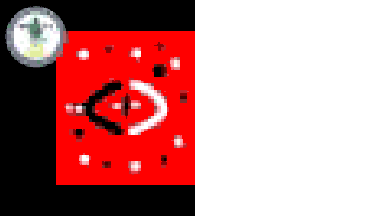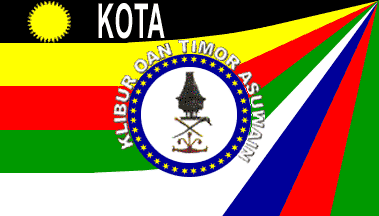 zachary harden
zachary harden
Keywords: kota | klibur oan timor asuwain | stars: ring | stars: 33 | kaibauk | house | sun: 32 rays |
Links: FOTW homepage | search | disclaimer and copyright | write us | mirrors

FOTW beschäftigt sich mit der Wissenschaft der Vexillologie (Flaggenkunde).
Alle auf dieser Website dargebotenen Abbildungen dienen ausschließlich der Informationsvermittlung im Sinne der Flaggenkunde.
Wir distanziert uns ausdrücklich von allen hierauf dargestellten Symbolen verfassungsfeindlicher Organisationen.
Last modified: 2023-06-03 by  zachary harden
zachary harden
Keywords: kota | klibur oan timor asuwain | stars: ring | stars: 33 | kaibauk | house | sun: 32 rays |
Links: FOTW homepage |
search |
disclaimer and copyright |
write us |
mirrors
 image by António Martins, 09 September 2007
image by António Martins, 09 September 2007
Leaflet [t9l07] shows a totally new flag
(replacing the previous one), divided vertically in two
equal areas: the fly side plain white and the hoist side red with black bordure
in all three flag edges; black and white round spots speckled on the red area
and centered on it a vertically divided black and white ring; on the top hoist,
partly overlapping the red area, a white disc with light purple rim and
something on it. I don't know exactly when this new flag replaced the
previous: sometime between 2001 and 2007…
António Martins, 09 September 2007
Douglas Kammen (http://journals.cambridge.org/action/displayAbstract?fromPage=online&aid=5517384) gives in his paper interesting information about the black-white flags of the KOTA party (which was used by Aliansa Demokratika of KOTA and P.P.T.). KOTA-general secretary Manuel Tilman explained in 2007 to the Portuguese magazine Público [Paulo Moura, ‘O Socialismo místico de Manuel Tilman’, Público, 1 Apr. 2007; translated by Janet Gunter.]:
He declares himself socialist, monarchist and mystic. Manuel Tilman is in front of the flag of the party he runs, KOTA, explaining its meaning. It is not easy. ‘Black represents the darkness, white the light … There is a movement from the darkness to the light. Then we have the numbers 8 and 1. And 8 is magic, also among the Hindus and Buddhists. On its side, it means infinity in algebra. The 1 signifies that we believe in just one God.’and more:
‘This flag has existed in Timor since the first men, 6,000 years BCE.’
The same flag?
‘Exactly the same. It has existed since the beginning, in keeping with our suppositions, representing, now, our difficulties … There were two confederations – that of Lorosomo [sic, Loromonu], with 16 kingdoms, and that of Belos, with 36. Each one had a king, but there was a treaty to divide the powers. Lorosomo [sic] had the political and religious powers. The one on this side, the Belos, the military and administrative. That is why we are so irascible…. Politically we are separated. But we are just one nation. I have a project of unification, but it is not for the moment. On the other side, they also know and adopt this flag.’
The monarchist party KOTA flies two flags – one for the party, the other a black flag representing Timorese ‘culture’ – and proposed that the constitution acknowledge and maintain ‘traditional culture’.About the party flag of Partido do Povo de Timor (PTT) and the party president Jacob Xavier, Kammen explained:
In 1979, while still in Portugal, Xavier was involved in the formation of the Dili Timor National Liberation Movement (Movimento Nacional da Libertação de Timor Dili), but left the group because of internal disputes. In 1985, he established the Movimento Popular Timor-Leste (Timor-Leste Popular Movement), taking the movement’s blue and white flag (which closely resembled the royal flag of the Bragança dynasty) to the United Nations. The following year was a turning point in Xavier’s life and political claims. ‘Fifty years after being born’, he explained, ‘some Portuguese and American family members told me I was the true heir to the Portuguese throne. I didn’t believe it, but then I investigated and today I have no doubts.’J. Patrick Fischer, 17 May 2012
By virtue of his right to the Bragança throne, he is also related to the English royal family. An article in the Lisbon daily Lusa explains that the English royal family had a bar of uranium given by the Kennedys installed into Xavier’s head. The reason, according to Xavier, is ‘[t]o be always contactable and to be oriented by the best principles’.
 image by António Martins, 22 September 2001
image by António Martins, 22 September 2001
In the 2001 elections the flag of KOTA had a
multicolor background consisting of five equal horizontal stripes (black,
yellow, red, green and white) which curb to the upper fly in a perspective
effect; three more stripes (dark blue, red and green) add to this effect from
the bottom fly (being thus rather triangles, not stripes). Over all, the party
emblem: a white disc bordered in dark blue with the party name arced around the
upper outside of the disc in bold white capitals. On the disc, a traditional
Timorese house, two crossed clubs, and a kaibauk (a traditional Timorese
symbol of authority); on the border 33 small yellow stars(?) — I don't
know the meaning of this number 33, it is neither the number of
districts (13) nor their subdivisions (64). On the black
stripe, at the hoist, a yellow 32-rayed sun and the lettering "KOTA" in
uppercase squeezed white sans capitals.
António Martins, 22 September 2001
I don't know exactly when the new flag replaced the
this previous one: sometime between 2001 and 2007…
António Martins, 09 September 2007
In the 2007.06.02 elections KOTA run in a
coalition with P.P.T., labeled Aliansa
Demokratika (Democratic Alliance), which got 13 294 votes (3,20%),
receiving 2 of 65 seats in the parliament, one for KOTA and one for
PPT.
J. Patrick Fischer, 09 September 2007
KOTA got 7735 votes in the 2001.08.30 elections
(2,13%), receiving 2 of 88 seats in the parliament. Though is was created still
during the Indonesian occupation, being thus one of the
“traditional” parties, it is one of the small parties in
parliament.
António Martins, 22 September 2001
Hosted by: Fanshop-Online.de und Handy-Shop.de
Tipp: Apple iPhone 15 im Shop